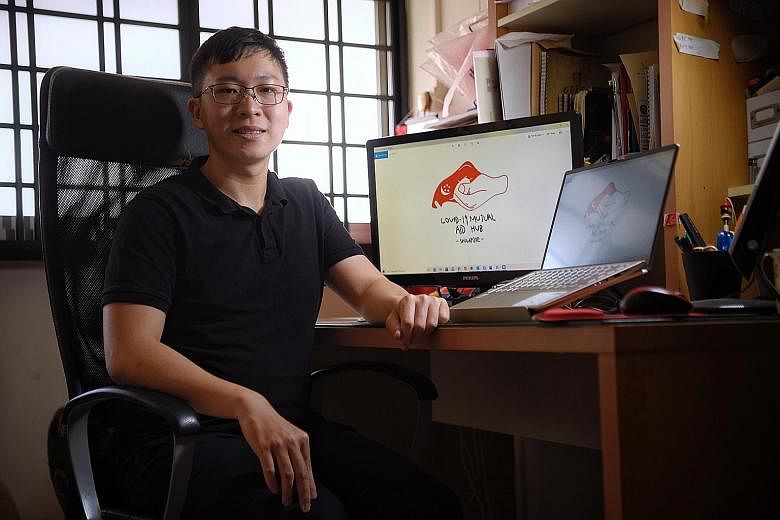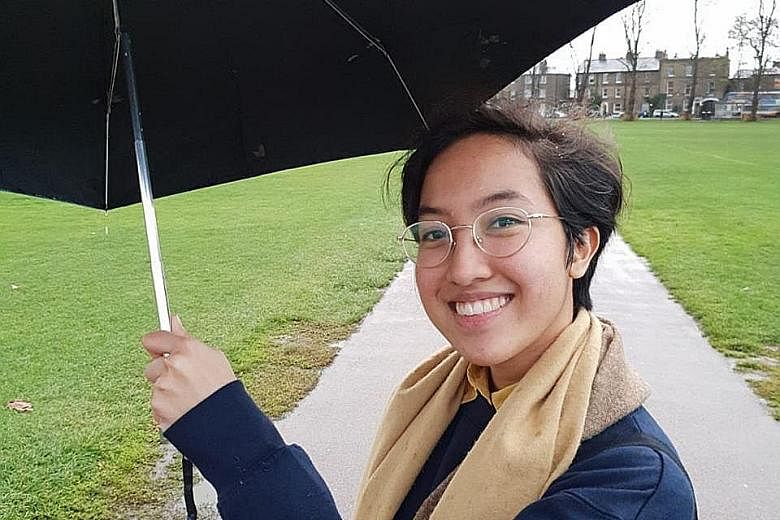Until the coronavirus pandemic came along, freelance consultant Isaac Neo, 26, had not been involved in organising any social initiative in Singapore.
But when he read about how vulnerable groups, including migrant workers and low-income earners, were suffering amid the crisis, it prompted him and eight others to start the Covid-19 Mutual Aid Hub in April. The hub is a search portal which consolidates ground-up initiatives to make it easy for those in need to find help.
The act of volunteering for this, and talking to others around him affected by the crisis, gave the political science graduate insights on social welfare and inequality.
He says more should be done to make financial relief schemes more accessible to the lower-income. "Before Covid-19, these issues were abstract, but I saw the impact of the crisis and it has helped to open my eyes to these issues."
He is among several young people in Singapore The Straits Times spoke to who say that while the crisis has upended their life plans, it has prompted them to reassess the values they believe should undergird society and galvanised them into action if they saw a need.
Cambridge University undergraduate Leia Devadason, 21, says the extra downtime and heightened political consciousness she gained amid the pandemic gave her an opportunity to set up a political website, Grassroots Level Party, with her friend Megan Lim in March.
The music student had returned from Britain in March because of concerns over Covid-19 there.
The site, which provided information about elections and the political system in Singapore ahead of July's general election, was widely shared on social media, climbing to an average of 2,000 views per day in the weeks leading up to Polling Day, says Ms Lim, 21, a student at the School of Art, Design and Media in Nanyang Technological University.
Echoing Minister for Culture, Community and Youth Edwin Tong, who said in Parliament in September that rapid changes in Singapore's socio-political environment have been catalysed by the Covid-19 situation, Ms Devadason says it has prompted young people like her to reassess their place in society and consider how policies affect their lives.
Ms Lim says that social media provides an accessible avenue for young people to engage in conversations about politics and policies with their peers even as social distancing rules are in place.
Says Ms Devadason: "It felt like a breakthrough point where something in the old society was being put to rest and we were in a position where we could imagine how we could take ourselves forward.".
Having been exposed to the societal inequalities that Covid-19 has laid bare, she hopes to see a more equitable and compassionate society that is open to dissent and critical discourse.
The pandemic has also shaped the views of young people on various social issues.
According to the National Youth Council (NYC), participants at an Emerging Stronger Conversation in September - part of a series of dialogues organised by the Government - expressed concern about the power asymmetry between employers and migrant workers.
They were concerned about challenges faced by lower-income workers and said more could be done to support local food production.
Ms Megha Saha, who volunteered as an English-Bengali translator for the migrant worker community when Covid-19 cases peaked in dormitories, says her involvement in these efforts opened her eyes to issues confronted by migrant workers in Singapore, such as how they may face barriers in accessing healthcare.
The 23-year-old, who works in the tech industry, says support for migrant workers in Singapore should be stepped up.
An NYC spokesman says that the mental well-being of many youth has been affected by the pandemic as they face anxiety over an uncertain future, and stress over work and studies, among other things.
According to a poll of 1,000 young people aged 16 to 34 in August, one in two respondents said Covid-19 has had an impact on their mental well-being.
But, at the same time, awareness of such issues has grown, with more youth stepping up to reach out to their peers struggling with mental health issues, says Mr Asher Low, executive director of Limitless, a non-profit organisation that works with young people.
While the pandemic has presented great challenges, Singapore's young people have proven themselves to be resilient and adaptable, says the NYC, which has partnered integrated marketing agency DSTNCT to collect stories of Singaporeans' Covid-19 experiences.
These include marketing executive Ameline Tan, 24, who was engaged last year and had planned to get married in August this year.
She had to call off her wedding and return a resale flat to the Housing Board after breaking up with her fiance in June, after the circuit breaker.
Not being able to see each other because of Covid-19 restrictions during the circuit breaker created a lot of misunderstanding between them, she says, and accentuated differences in personality and values between her fiance and her.
Though the break-up cost her thousands of dollars in forfeited deposits, Ms Tan says that in hindsight, she was lucky to have discovered these issues with her fiance before committing to marriage.
"I have gained more than I lost," she said. The break-up also drew her closer to her family, with whom she got to spend more time during the circuit breaker and who quietly supported her through her relationship difficulties.
Ms Devadason, who had two summer programmes in music writing and conducting in Germany and Britain cancelled because of Covid-19, says the pandemic has taught her how to better deal with uncertainty.
"I'm used to planning ahead and being guided by a sense of direction, but my plans fell through and it has given me a sense of perspective. Covid-19 has disciplined me into taking things as they come.
"There isn't really a set path that you have to take at a certain point of time, but rather, there are many paths and you are just travelling on one of them and it's okay."
Singapore Management University law don Eugene Tan says the pandemic has appealed to young people's belief that they have to be even more engaged, especially given the Government's emphasis on remaking Singapore for the post-Covid-19 world.
"There is an acute sense among some youth that they have an important stake in the future. They seek to ensure that their views and concerns are taken into account and engaged with in a purposeful manner," he says.
"How we tap those inner convictions and aspirations will matter. The worst is to be patronising about them and towards the youth."



